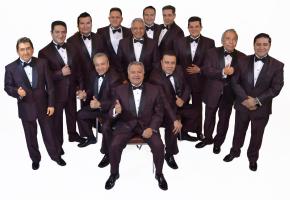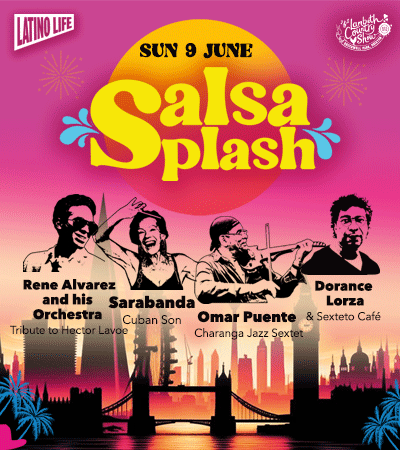Sonora Dinamita is a Colombian cumbia group, and one of the first of its kind to become internationally popular, introducing the genre to the world stage. The band released its biggest hits from 1985-95, which was when the group was catapulted to a global level with hits such as Escandalo, Mi Cucu and Que Nadie Sepa Mi Sufrir.
The group was originally formed in Cartagena de Indias, Colombia, by musical director Lucho Argain in 1960. So far, they have had more than 700 releases, of which more than one hundred have reached Top Ten lists around the world. Next year, on the 22nd of March, Sonora Dinamita will celebrate sixty years since its creation.
The band comes to London for the first time on the 15th of September to perform their most celebrated songs, with exciting guest performances. Carlos Alvarez, the band’s manager and lead singer, discusses the band’s history, the joy of cumbia, and what it can learn from the popularity of reggaeton.
LatinoLife: Carlos, for someone who has never heard cumbia before, could you describe the genre?
Carlos Alvarez: Cumbia is a genre that both touches your heart and makes you want to dance. It’s a sensual genre that will free you of stress and make you want to move your hips! Going back to the origins of cumbia, the genre was created by black slaves who would drag their foot because of the shackles they were forced to wear. Due to this, in cumbia one also drags their foot; it’s a lament of the slaves about their experience. Sonora Dinamita’s first songs speak a lot about this history of slavery. Cumbia was a means of liberation from slavery and with time it has become a means of freedom for everybody. It can transform you even if you’re shy, it can rid you of whatever is troubling you.
LL: Thanks to Sonora Dinamita, the genre of cumbia was popularised internationally. How does it feel to be part of a group with such a legacy?
CA: It’s a huge responsibility for any of the members of the group. We all carry the weight of being part of cumbia’s history. As you say, Sonora Dinamita is one of the groups that made the tropical genre of cumbia popular, and which helped to internationalise this genre which was previously only known to Latin people.
LL: Where does the name Sonora Dinamita come from?
CA: The group is called Sonora due to its use of trumpets and was created to pay homage to a Cuban group called Sonora Matancera. Sonora Dinamita is the Colombian version, which aimed to create music similar to that of Matancera but in a Colombian style. Many other groups were born out of the same reason, also called Sonora: Sonora Santanera, Sonora Carruseles, etc.These groups adopted the same name also because of their use of two trumpets.
LL: Can you remember the first time you heard Sonora Dinamita’s music?
CA: Of course! I grew up with the band as my father was one of the musicians and founders of the group, Saul Alvarez. Its music has been with me literally since my mother was pregnant with me, I grew up listening to them and I was always taken to their concerts.
LL: What other future concerts do you have coming up?
CA: Currently we are about to embark on a tour in Mexico called Cumbia 60’s Box Tour. One of our biggest performances ever will happen on the 15th of November, when we’ll perform at the Auditorio Nacional, one of the most important venues in Mexico. We are going to travel back in time from to the 1960s, and transform the stage. We are going to play more than 60 songs, including our duets - we think you’re really going to love it.
LL: You mentioned the duets you perform. How do you choose who to play with?
CA: We look for artists who are truly talented and who are current on social media. In Mexico, on the 15th of November, many artists are coming with us, such as Eduardo Antonio, a Cuban composer and singer who has written many songs for Mexican telenovelas. The new artists that we are working with are great talents, and I think they will work really well. One new artist we will perform with, Alex Serhan, has been nicknamed the ‘Mexican Frank Sinatra’! All the new songs are 100% unprecedented, that is to say, they’re not going to be covers of the old Sonora Dinamita songs like in the past. We have a duet with a group called Mi Banda El Mexicano, a group who were very popular in the 1990s. We did the songs which they recorded, in the style of Sonora Dinamita. In total, more than ten artists are invited, it’s going to be great!
LL: Can you tell us about the artists coming with you to perform in London?
CA: We are bringing a Mexican singer with us on the tour who is very prominent on social media, called Flor Amargo. She is a really popular artist who used social media to build her platform through 100% raw talent. We are also coming with a Mexican soprano singer called Karla Lazo, who is based in France, and whom we recorded a song with last year. We recorded a video together in Paris of Edith Piaf’s La Foule (Que Nadie Sepa Mi Sufrir). So we have the popular song Que Nadie Sepa Mi Sufrir, but now in French. Having done these duets, if there is any English artist who would like to record with us it would be a total honour!
LL: Do you think that these duets help to keep cumbia’s popularity with young people?
CA: Of course, I think it’s because of this that Sonora Dinamita has managed to keep going for sixty years. As well as this, within the genre of cumbia, we blend in different styles. In Mi Cucu, for example, there are sections of speaking, in Escandalo there’s rap. Other songs that we have right now have bachata, others have reggaeton. Right now, urban music is really in fashion amongst young people, and whilst we never lose the original sound of Sonora Dinamita, we try and add new styles. Holding on to this original sound is important to us though, as it’s very iconic - you can listen to any other tropical group, but you can tell immediately when Sonora Dinamita comes on. The band created its own genre of cumbia, it has its own distinct sound and style with the trumpets, the percussion; all the instruments have their own unique sound.
LL: Why do you think reggaeton has been so successful?
CA: I think that reggaeton really brings artists together and there is little of the competitiveness of the past. There is a lot of collaboration within urban music and reggaeton artists are constantly releasing duets together and this has led to the genre prevailing, when we, the old school musicians, always thought it was a genre that wouldn’t last long. We really thought it was a temporary thing but no, it has been a surprise! They have obviously been successful because they are very unified and this is something we should all aim to be.
LL: Do you think it will be difficult playing to a non Latin American audience?
CA: I don’t think so, I think they’ll be great. Whilst there will be lots of people that don’t speak Spanish and so won’t understand our songs, there are also many Latinos who don’t understand English but love songs from English, American and Canadian artists. I don’t think language is a barrier for music - at the end of the day we all like to move our ‘Cucu’ right?
Sonora Dinamita play at Electric Brixton on the 15th of September: https://www.comono.co.uk/live/sonora-dinamita/



















